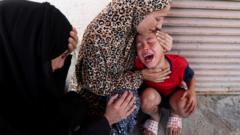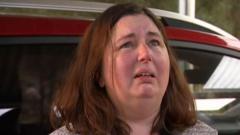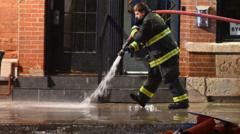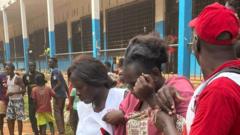Pope Francis, at 88 years old, faces a serious health challenge as he is hospitalized with bilateral pneumonia, a potentially life-threatening condition characterized by infections in both lungs. Experts highlight that pneumonia can have severe implications for older patients, particularly those over 85, and while effective treatments are available, the pope's situation remains critical.
Pope Francis Hospitalized with Serious Bilateral Pneumonia

Pope Francis Hospitalized with Serious Bilateral Pneumonia
The Vatican confirms that Pope Francis is currently undergoing treatment for bilateral pneumonia, raising health concerns due to his advanced age.
Pope Francis, who is presently hospitalized, is diagnosed with bilateral pneumonia, as announced by the Vatican on Tuesday. This medical condition indicates the presence of pneumonia in both lungs, as explained by Dr. James Musser, an infectious disease expert. He cautioned that assessing a patient's specific condition is not possible without a full examination. Generally, pneumonia infects the small airways of the lungs, causing inflammation and the accumulation of immune cells, which may lead to fever, cough, and chills. Doctors often use a unique diagnostic technique involving the patient's vocalization to help identify the illness.
While most pneumonia patients recover outside of hospital settings, older adults are at a heightened risk, with experts noting that the mortality rate significantly increases for those aged 85 and above. At 88, Pope Francis's advanced age adds to the concern surrounding his health condition.
Dr. Peter Chin-Hong from the University of California, San Francisco, points out that Streptococcus pneumoniae is the most common bacterial cause of pneumonia, detailing that while antibiotics may be effective, there are scenarios where bacteria can cause further complications like sepsis. Conversely, Dr. Paul Pottinger underscores that bilateral pneumonia is often linked to viral infections or other bacterial threats, such as influenza and respiratory syncytial virus (RSV), which complicate matters further.
Both specialists, Dr. Chin-Hong and Dr. Pottinger, express significant concern regarding the severity of Pope Francis's illness, indicating that it is indeed a troubling health situation that demands close observation and expert medical attention.
While most pneumonia patients recover outside of hospital settings, older adults are at a heightened risk, with experts noting that the mortality rate significantly increases for those aged 85 and above. At 88, Pope Francis's advanced age adds to the concern surrounding his health condition.
Dr. Peter Chin-Hong from the University of California, San Francisco, points out that Streptococcus pneumoniae is the most common bacterial cause of pneumonia, detailing that while antibiotics may be effective, there are scenarios where bacteria can cause further complications like sepsis. Conversely, Dr. Paul Pottinger underscores that bilateral pneumonia is often linked to viral infections or other bacterial threats, such as influenza and respiratory syncytial virus (RSV), which complicate matters further.
Both specialists, Dr. Chin-Hong and Dr. Pottinger, express significant concern regarding the severity of Pope Francis's illness, indicating that it is indeed a troubling health situation that demands close observation and expert medical attention.




















